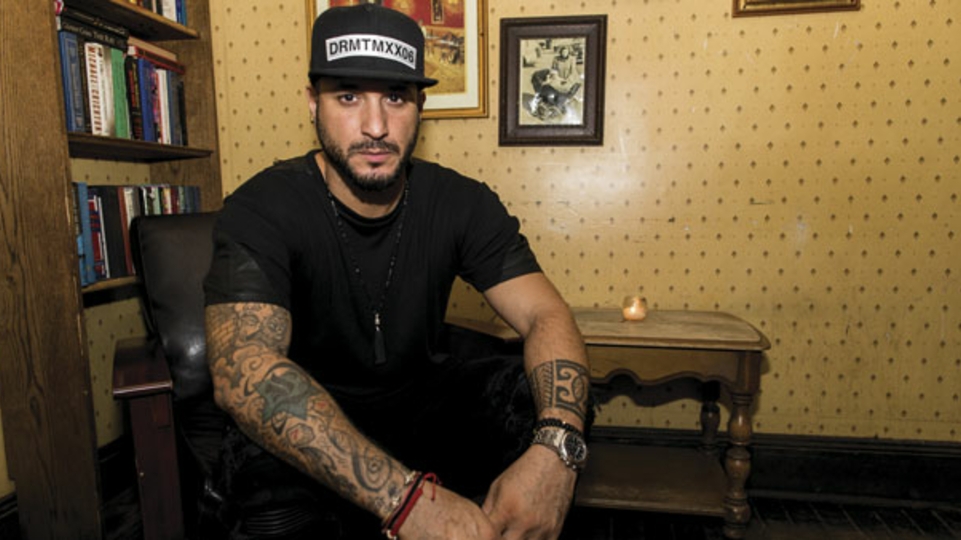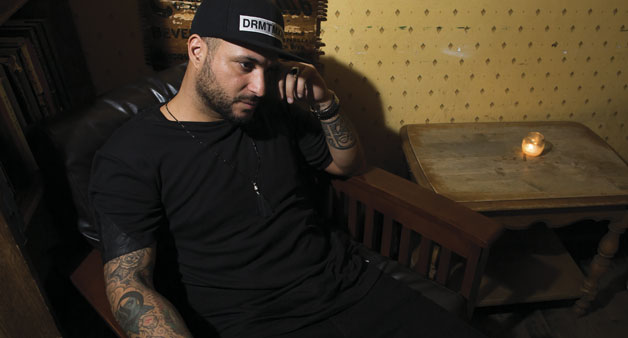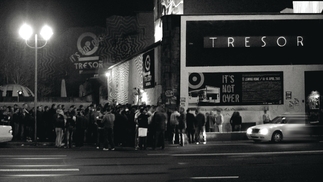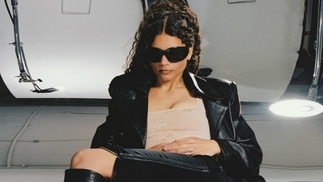ROLLIN' WITH LOCO DICE
Loco Dice talks new album and more...

Loco Dice is heading to Brooklyn. In Manhattan for the listening party for his latest LP, ‘Underground Sound Suicide’, we catch him in a moment of calm as he waits for a friend to scoop him up and drive him to its decidedly cooler, neighboring borough. The German native from Düsseldorf feels at home in New York, having cut his teeth in the city a decade ago during what he calls “the deepest winter.” Like any soul that has survived the grind and lived to tell a successful tale, a part of Dice will always be there. Much of his music is an ode to the concrete jungle, both intentionally and one must assume, subconsciously.
You can take the artist out of New York, but you can’t take New York out of the artist.
Fittingly, the opening track of his new album is called ‘Leavin’ Brooklyn’, a deliberate choice that picks up where ‘M Train To Brooklyn’, the final track on his prior album, left off. The song itself is a downtempo arrangement full of warm harmonies and chords that elicit feelings of departure; of leaving something loved in search of something new. Its sound is intentionally similar to ‘M Train To Brooklyn’.
As Dice explains, “I needed an intro to this album without starting off completely weird. I needed some sort of bridge to ‘7 Dunham Place’ [his 2008 debut album]. But how the album starts is not how the album is going to be. It’s a journey.”
The irony of the numbers is not lost on Dice, who laughs as he makes the reference: ‘Underground Sound Suicide’ comes exactly seven years after releasing ‘7 Dunham Place’. It represents the culmination of a life cycle, the completion of a journey and as such, the album itself is, literally and figuratively, arranged to reflect that journey with a distinct beginning, middle and end.
“With this album, I felt a bit more free. I felt more like my past came back to me ... like a circle was closed.” He pauses for a moment before continuing, “It took me seven years to make this album. I was not ready. I had nothing in my head. I was completely empty. Sometimes, I had an idea to go to the studio and do an EP or single but that was as a DJ. As a DJ you feel like you’ve gotta deliver the sound for the people who are on the dancefloor. But with an album, you don’t think that much about the dancefloor. Instead, everything comes from the heart and you can experiment more.”
BACK TO HIS ROOTS
Dice may not have had the dancefloor in mind while creating ‘Underground Sound Suicide’ for the better part of a decade, but the dancefloor will undoubtedly appreciate what he has delivered. As he alludes to, it is in many ways experimental — not the traditional techno sound one might expect to hear him drop in a club.
But that’s precisely what makes it so enjoyable. His journey is reflected both in the track titles and in the progression of the sound itself over the course of 15 cuts. ‘Leavin’ Brooklyn’ gives way to ‘Back In Flingern’ three songs later, a nod to Dice’s home neighborhood in Düsseldorf where he grew up.
That track shifts the tone of the album, ushering in the techno that Loco Dice is known for, without turning into a floor banger. Like the tracks before and after it, its tempo and texture are deliberately constructed to reflect a specific point in the story: in this case, Dice’s return to his roots after evolving as an artist in New York City. It is a confident and upbeat groove.

“‘Back In Flingern’ is how the album really starts,” Dice says, “with raw, rough beats and giving you the impression of, ‘Okay, this is the journey we’re on now.’ For me, each track is always written like I’m writing a movie ... that’s the way I like to produce ... I try to put together the pieces of what’s bouncing around in my head.”
Dice was born and raised in the small city of Düsseldorf, the child of Tunisian immigrants during an era when, as he explains, choosing his words carefully, “Germany was not that friendly.” He faced a lot of trouble in his youth and was unsure if his parents would even keep him in the country. But, as it does for people the world over, music saved the day. “Thank God music came along,” he sighs.
“‘My parents were listening to Santana and old, cheesy Julio Iglesias, plus folk music with drums. In Tunisia we call it ‘mezwed’, which is basically just real drums and a horn playing on top. It’s like a hypnotic drum sound. Meanwhile, my uncles were listening to funk and soul; Michael Jackson, Prince, Zappa, Chaka Khan, all that noise. So without knowing it, I really got a cool music education.” Dice laughs as he recalls the wide range of early influences.
“I found myself lost in music,” he smiles. Early on, his inspiration came from West Coast hip-hop, because although he barely had a clue what the likes of N.W.A. and Ice Cube were saying, he “could figure out that it was about unity, homies and being strong together.” Listening to Kid Frost’s Chicano rap reminded him of his own Tunisian background, and ushered him into a life in music.
BRING IN THE DRUMS
As a teenager, Dice ran away from home. “I hated Germany then. I ran away to Rotterdam, but that didn’t work out,” he recalls. After returning, his journey toward electronic dance music began, inspired in large part by a pair of Germans at a Düsseldorf record store called Sounds Good. “The store was run by these two gay guys, Deiter and Wilfred. They played a very key role in my musical education because they were the ones who started to deliver US house to me. They introduced me to Danny Tenaglia, Miguel Migs, Lisa Shaw. This is how I discovered Doc Martin. You can’t just discover Doc Martin in Germany when you come from hip-hop,” Dice laughs.
“I had a really good education from those guys; the best. They had even been in Studio 54 and they’d tell me stories about New York and London, without dictating, without saying, ‘you have to do this or that,’ but in an easy way. And I LOVED it,” he reminisces.
Hooked on the US house music sound, Dice packed himself up in 1998 and moved to Ibiza, settling into the scene there during the rise of the Balearic house sound, which was largely drum-based. This suited his Tunisian background and his first ever record, ‘Phat Dope Shit’, found favor with Danny Tenaglia, who was the first DJ to play it. That heavy drum influence has never really left Loco Dice’s productions, despite his evolution as a producer. It is in his DNA.
As ‘Underground Sound Suicide’ goes, those drums creep in slowly, making their presence known in ‘Back In Flingern’ and snapping into a heavy, wildly addictive groove in ‘Keep It Low’, a collaboration with fellow German techno maestro Chris Liebing that is one of the best cuts on the LP. If the album is indeed a movie, then ‘Keep It Low’ is the part of the story where Dice begins to strut, the confident protagonist who’s found his swagger and wants everyone to know it. The rolling beat is backed by a gritty, angry synth and re-pitched vocals courtesy of Dice himself that urge the dancefloor to smoke some weed.
“I actually had the story [for the track] for a long time in my head. A main topic I was talking about with Chris was that people don’t have fun anymore. And I had this idea about this schizophrenic guy that’s living in two worlds in his head ... Chris and I were playing around with the instruments and I was like, ‘C’mon, gimme the mic and I’ll do it right now.’ It was done in one take!”
MADE MEN
‘Keep It Low’ mixes right into the album’s title track that follows it, ‘Get Comfy (Underground Sound Suicide)’ featuring English rapper Giggs. A ripper of a tune, ‘Get Comfy’ gives the entire album a cocky vibe, thanks in no small part to Giggs’ brash vocals which Dice insists are intended to light things up. “The US boys, they don’t get along with the lyrics because they maybe don’t understand what Giggs is talking about ... he’s just taking the piss out of it! Totally. He’s told me, ‘Bro, this track is for the ladies. The boys may need a while to understand it, but the girls, they’ll get it completely.’”
The juxtaposition of the aggressive hip-hop vocals with a groove that is techno through and through adds a unique texture to the track. ‘Get Comfy’ may allude to Dice’s desire to have the music world relax and take itself less seriously, but the resulting cocky vibe will undoubtedly prompt all sorts of strutting across dancefloors. In keeping with the song’s unapologetic brazenness, Dice reminds us that music is for everyone: “Music should be FREEDOM, man. This is how I discovered electronic music myself. You dance, you move, you look the way you want to be! Don’t give a fuck.”

That cockiness and swagger, though delivered by a German producer and UK rapper, is redolent of New York City no matter how you slice it. Dice landed in the city that never sleeps in 2006 with his Desolat label co-founder, Martin Buttrich, and it was there that ‘Underground Sound Suicide’ began to take shape in his mind.
In New York, Dice learned how to work, and work fast. “I moved to Brooklyn where we had a shitty loft,” he laughs, “and everything went wrong that could go wrong.” Their studio gear got stuck in customs for two months giving Dice and Buttrich time to explore the city, its people and, above all, learn how to survive with very little money.
“But after New York, we were made men,” Dice states. “And here I am now. I live in Düsseldorf, traveling around the world, and right now I’m back in New York, talking to you, about to head over to Brooklyn.” He laughs and without saying it, the circle is closed.
Pics: Andrew Rauner





